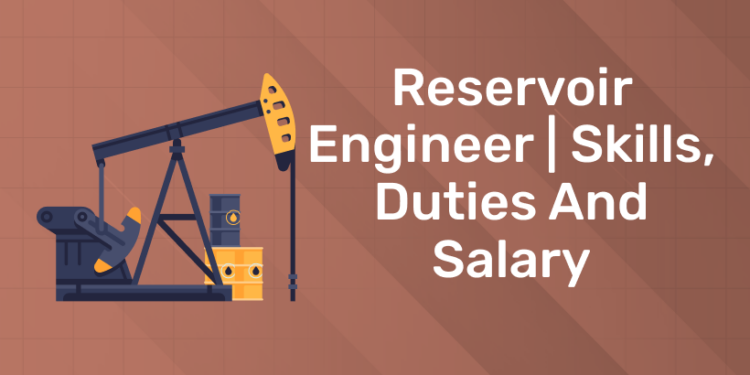Table of Contents
Reservoir engineers are experts in evaluating the hydrodynamic values of underground reservoirs. They use advanced technology systems and applications to find and identify various oil and gas reserves. We also analyze market trends and consumer demand to determine oil and natural gas costs, particularly for investment and drilling operations. They are responsible for evaluating development plans, finding suitable candidates for increased production and determining the most efficient way to extract oil and gas. We also manage the removal of the company’s equipment and the proper disposal of waste after the extraction process is complete. They use tools such as type curves and fit interval scenarios to predict in-situ production lines and perform mass balance calculations to better understand reservoir behavior. We will also conduct storm damage recovery economic assessments and prepare project economics and sensitivity for development and production operations. They are expected to have strong analytical, communication and problem solving skills.
Reservoir engineer is one of the promising jobs in oil and gas exploration. Reservoir engineers must be experts in analyzing geological data, creating reservoir models and implementing strategies to optimize production efficiency. This article explores the responsibilities, skills and challenges facing reservoir engineers and highlights their significant contribution to the industry.
Join our Oil and Gas Course! Get Free Demo!
How to Become Reservoir Engineers?
Most reservoir engineers have a bachelor’s degree in a petroleum-related field such as petroleum engineering or chemical engineering, as most companies require this degree. This degree provides a strong foundation in engineering principles and fundamental knowledge of reservoir engineering.
Once you’ve earned your degree, you can take the following steps to improve your chances of becoming a tank engineer.
Prepare for On-The-Job Training
2 to 4 years of work experience in a related field. This may include positions such as engineering intern, production engineer and intern. This experience will allow you to apply your knowledge and develop specific reservoir engineering skills.
Develop Essential Soft Skills and Technical Skills
Soft skills such as creativity, problem solving and analytical skills are often preferred by recruiters, while skills in computer modeling, reservoir simulation, data analysis and related software tools commonly used in reservoir engineering will help you in this field.
Build a Professional Network
Join industry forums, attend networking events, and network with other reservoir engineers and experts in your field. Networking can lead to valuable opportunities, mentoring and career growth.
Eligibility and education requirements may vary depending on the employer and region. We recommend researching the specific qualifications that companies in your desired location are looking for and tailoring your education and career development accordingly.
Get Certified! Get Confident! Join our Oil and Gas Course!
Reservoir Engineer Responsibilities
1: What is the primary purpose of a refinery in the oil and gas industry?
As a reservoir engineer, your responsibilities include a variety of tasks that contribute to the overall management and optimization of oil and gas production. These tasks can include reviewing well data to identify candidates for production enhancement, performing mass balance calculations to predict reservoir behavior, and performing economic evaluations for project development.
Here are some examples of responsibilities from real tank engineer resumes.
- Trial managed pressure drilling (MPD) to reduce tight pressure margins.
- Develop and manage Spotfire production dashboards for cross-use and reporting.
- Reservoir performance monitoring for mixed CO2 and hydrocarbon flooding projects.
- Optimization of plans, development plans and EOR technologies. Overall performance analysis and economic evaluation.
- It supports reserve reserves, quarterly reserve transfer forecasts and asset operating cost modeling.
- Using the MPD as a guide, drill a 12-1/4″ hole.
- Maintains SBC operations on sales packaging and presentation.
- Update the list of WellView, x-over/subs/DP and pipes on the board.
- Cooperation and support of the well site during the entire well cycle.
- Develop a comprehensive drilling plan for use at the well site.
- Create multiple spreadsheets using macros to speed up data entry into WellView.
- Training new personnel to operate and troubleshoot organizational research and assessment tools.
- Oversees the placement of completion materials at the well site and compliance with HSE practices.
- Conducts cooling and thermal asset development plans and evaluates EOR development options.
- Work with BP to perform HazOp audits, rig acceptance and complete documentation.
What Are Reservoir Engineer Skills?
Reservoir engineering primarily involves extensive use of computer-based modeling and technology. In my experience, business hours are normal business hours. This is an area where technical expertise is emphasized rather than managerial responsibility. Therefore, tank engineering requires people with a strong technical background.
Creativity. The most important soft skill of reservoir engineers to fulfill their responsibilities is creativity. This skill is important for this role. Because “each new drilling site is unique and thus presents new challenges, petroleum engineers must be able to come up with creative plans to extract oil and gas. In addition, reservoir engineer resumes indicate that How they work depends on creativity.” Using GIS geographic information systems (arcview, arcinfo, arcgis) in order to optimize production.
Problem-solving skills. Another important skill for a reservoir engineer job is problem solving skills. Responsibilities of a Reservoir Engineer: “Identifying problems in a drilling plan is very important for a petroleum engineer because these problems can be costly.” For example, reservoir engineers use problem-solving skills in their roles “We used the material balance to solve volume adjustments for all reservoir blocks.”
Analytical skills. To perform their duties, analytical skill is an important skill for reservoir engineers. You must be able to understand. This excerpt From a resume showing how important it is to the daily role and responsibilities of a reservoir engineer, we used programs like aries, powertools and pi dwights to create type curves and analyze production.
Math skills. To perform the specific responsibilities of a reservoir engineer, this job requires the ability to have “mathematical skills.” For example, this piece is taken directly from a resume about how to apply this skill to a reservoir engineer job: “Carbonate reservoirs: Using geostatistical methods to evaluate porosity and permeability models against production data for 60 wells.”
What Are Reservoir Engineer Qualification?
- Bachelor’s or Master’s degree in computer engineering, computer science or electrical engineering,
- Experience with dedicated software or systems such as C, FPGA or Python.
- Familiar with workflows that include site design, file creation, and full stack development.
- Familiar with incident protocols such as Rust and simulation.
- Familiarity with topology, statistics and framework.
What Are The Professional Associations of Reservoir Engineers?
Reservoir engineers can benefit from joining professional associations that provide a platform for networking, knowledge sharing, and career development. Prominent professional organizations for reservoir engineers include:
1. Society of Petroleum Engineers (SPE)
SPE is a global organization dedicated to the development of the oil and gas industry. All designed specifically for reservoir engineers, they offer useful materials, technical publications, events and opportunities to connect with others.
2. Society of Petrophysicists and Well Log Analysts (SPWLA)
SPWLA is an association specializing in petrophysics and well log analysis. Reservoir engineers can access technical resources, participate in training programs, and interact with experts in the field of petrophysics.
In Asia, several organizations and professional associations specifically serve reservoir engineers and professionals in the oil and gas industry.
3. Asia Pacific Oil and Gas Conference and Exhibition (APOGCE)
Asia Pacific Oil and Gas Conference and Exhibition (APOGCE) is a major conference and exhibition that brings together oil and gas industry professionals from Asia and the Pacific. Reservoir engineers can participate in technical sessions, panel discussions and networking events to exchange knowledge, learn about industry trends and expand their professional network.
4. Asian Petroleum Technology Symposium (APTS)
APTS is a regional event focused on technological advancements and innovations in the petroleum industry. Reservoir engineers can benefit from attending technical presentations, workshops and exhibitions that introduce the latest technologies and methodologies related to reservoir engineering.
5. Society of Exploration Geophysicists (SEG) – Asia Pacific Region
SEG is based in the Asia-Pacific region and provides a platform for reservoir engineers and geophysicists to collaborate and exchange technical knowledge. The organization organizes conferences, workshops and publications covering various aspects of reservoir engineering and geophysics.
These professional associations provide a platform for reservoir engineers to learn about industry trends, expand their professional networks, and improve their knowledge and skills through continuous learning and collaboration with industry peers.
Another way to increase the number of like-minded people who can help you advance your career is to take an oil and gas training course. By enrolling in Entri course, you can expand your professional network while deepening your understanding of the entire upstream process, including exploration, drilling and production. Therefore, taking Entri course training courses will improve your technical abilities and strengthen your professional communication.
Are Reservoir Engineers in Demand?
Reservoir engineers are in high demand in the oil and gas industry due to their fundamental expertise in optimizing reservoir performance and maximizing production. Demand for reservoir engineers is expected to remain strong as the industry continues to evolve and strive to maximize the potential of oil and gas reservoirs.
According to industry reports, the demand for petroleum engineers is continuously increasing. According to the Bureau of Labor Statistics, job openings for petroleum engineers, including reservoir engineers, are projected to experience a steady growth rate of 8 percent from 2020 to 2031. These statistics highlight the continued demand for reservoir engineers as a critical element for the future success of the oil and gas industry.
Reservoir Engineer Salary
The total estimated salary for a tank engineer is ₹1,675,000 per year and the average salary is ₹1,400,000 per year. This number represents the median value. This is the midpoint of a range for our proprietary gross salary estimation model based on salaries collected from users. Estimated additional salary is Rs.2,75,000 per annum. Additional payment may include cash bonus.
Start your career in Oil and Gas field!! Join Now!
Frequently Asked Questions
What is a Reservoir Engineer?
A Reservoir Engineer is a professional who specializes in the analysis and management of oil and gas reservoirs. They are responsible for assessing the potential of oil and gas reservoirs, designing and implementing strategies for maximizing production, and monitoring the performance of the reservoir over time. They use their knowledge of geology, engineering, economics, and mathematics to make informed decisions about the management of oil and gas reservoirs.
What qualifications are needed for a Reservoir Engineer role?
The qualifications necessary for a Reservoir Engineer role vary depending on the employer and the specific job role. In general, employers usually look for a minimum of a Bachelor’s degree in Petroleum Engineering or a related field. Additional qualifications such as a Master’s degree, professional engineering license, or additional certifications may be beneficial. Additionally, experience in the oil and gas industry, knowledge of reservoir engineering software, and strong communication and problem-solving skills are all desirable qualities for this role.
What does a Reservoir Engineer do?
A Reservoir Engineer is an oil and gas professional responsible for optimizing the development of oil and gas fields. The Reservoir Engineer is responsible for designing and implementing strategies to maximize the recovery of hydrocarbons from the reservoir. This includes assessing the reservoir’s characteristics, such as pressure, temperature, permeability, and fluid composition, and using this information to develop a development plan. The Reservoir Engineer also works with geologists and other professionals to ensure that the development plan is feasible and cost-effective.











